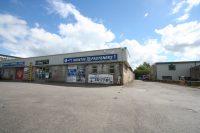My boss has just said they want me to buy the company, now what?
Sometimes a Management Buy-Out comes about because the management team have an ambition to own the company and approach the owners. In other cases, the MBO might be originated by the owners, who see it as their best route to selling the company and seeing it continue in its current form.

23rd June 2021
-
Mark Neath See profile
-
Kathryn Mansell See profile
This was the situation facing Robert Gillard, manager of Wentin Fasteners Limited in Yeovil.

‘I have worked in the company for ten years and have been managing it for the last seven. The owners have reached a stage when they wish to retire and came to me with a proposal from their accountant for me to buy the company. It all looked exciting on paper, but deal structures and financing are not something I have ever needed to get involved in before. I knew I was going to need some specialist advice’.
Robert approached Old Mill for Corporate Finance advice on the deal. Mark Neath, Director of Corporate Finance recommended a structure involving a new holding company to acquire the shares in the trading business.
Where there is borrowing or deferred consideration, which is usually the case with a Management Buy-Out, a holding company is usually required as banks can lend to companies in a way they’re unable to for individuals. There are also tax savings, since a company can make repayments out of income taxed at Corporation Tax rates (currently 19%) whereas an individual repaying a loan has to do so out of funds that will have had Income Tax deducted, often at 40% or more.
The holding company structure wasn’t included in the sellers’ original plans, so we met with the sellers to explain how the process worked and why this would be the best way to structure the deal both for the buyer and sellers. This is another example of how Old Mill Corporate Finance works in a collaborative way with all parties and their advisers to help get the best possible deal for everyone.
Once the deal structure and terms were agreed and documented in Heads of Agreement, the next step is for the buying team to undertake their due diligence and for solicitors to prepare the legal contracts for the deal.
Robert had been running the company on a day-to-day basis for a number of years and so was well-informed of its operations and risks. The knowledge that the buying team already has of the business reduces the need for due diligence investigations and for warranties in the purchase agreement. However, Robert had no involvement in the company’s accounts or tax. This is quite common in a Management Buy-Out situation and hence the limited due diligence which was undertaken was all directed at the company’s tax compliance history, and this work informed the warranties in the Share Purchase Agreement.
Heads of Agreement were signed just before the Christmas break and the deal completed at the end of February.
When presented with an opportunity to purchase the business you work in, this is exciting of course, but can also be daunting. Robert says:
‘Old Mill held our hand throughout the process and took all of the worries away. Mark and his colleague, Kathryn Mansell, were always on hand to answer any little questions we had. It has been an absolute pleasure working with Mark to get our purchase over the line. In fact, our first official act as the proud new owners of Wentin was to appoint Old Mill to be the company’s accountants going forward’.
For further information in the first instance please contact your usual Old Mill adviser, or alternatively click here…
‘Old Mill held our hand throughout the process and took all of the worries away. Mark and his colleague, Kathryn Mansell, were always on hand to answer any little questions we had. It has been an absolute pleasure working with Mark to get our purchase over the line. In fact, our first official act as the proud new owners of Wentin was to appoint Old Mill to be the company’s accountants going forward’.
Robert Gillard, Wentin Fasteners Limited



